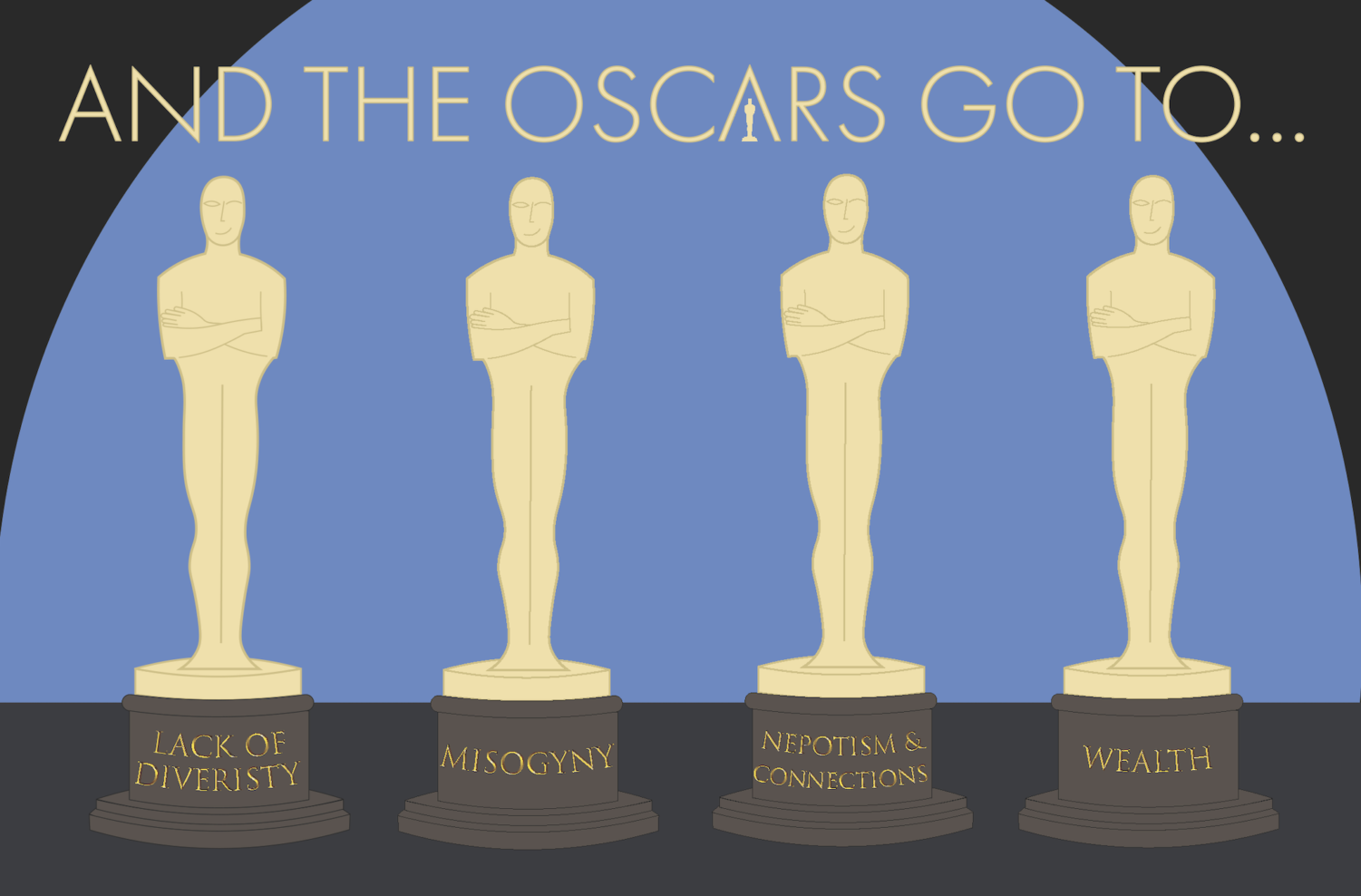Set to take place on March 12; the Oscars is an annual award show supposedly recognizing the best of the best in film. However, since the Oscars began in 1927, the Academy has faced numerous accusations of being both discriminatory and rigged. Every year, controversy surrounds the award show due to the lack of diversity in the nominees and the disregard for certain beloved films and actors. As a result, the Oscars are less a reflection of excellence in film than a reflection of the Academy’s biases and prejudices.
Every year, over 9,000 Academy members — who join through either sponsorship from existing Academy members or by being nominated for an Oscar — vote to recognize the best movies, performances and behind-the-scenes work. Speaking in a purely technical sense, the Oscars aren’t rigged; Academy members select the winners in a closed-door vote. However, that doesn’t mean the members aren’t biased.
In 2022, 81% of Academy members were white and 67% were male; this lack of diversity reflects in the nominations and awards. Since 1927, Black people have won fewer than 4% of acting awards. On the other hand, 99% of the winners for Best Actress and 93% of winners for the Best Actor from 1928 to 2015 were white. In the past decade, 89% of nominations went to white people. Over the past decade, the Academy gave 74 nominations to people of color; in 2011 alone, it gave 72 nominations to white creatives from 120 total nominations. In the Oscars’ 95 years, men have accounted for 71.1% of nominations in the top eight categories and men have won three times more often than women.
After the #OscarsSoWhite movement — a response to the Academy’s all-white nominee list in 2015 — the Academy set an ambitious goal of doubling the number of women and people of color in its membership by 2020. Even though the Academy exceeded these numbers, doubling their female members and tripling their members of color, the 2020 Oscars still saw only one acting nominee of color.
While all art awards are problematic since excellence is highly subjective, it’s evident that the Oscars are biased even when race and gender inequalities are disregarded. Studios spend an extra $10 million on average to run an Oscar campaign, targeting Academy members with ads, mailers, screeners and events to influence their vote. Academy members usually recognize films that are more “important,” such as biopics or films based on true events. In 2020, Business Insider reported that 93% of movies that have won Best Pictures are dramas, and in the history of the Oscars, sci-fi and horror movies have never won the award. In 2016, National Geographic found that around a third of Best Actor or Actress winners played roles based on real people. This favoritism is known as “Oscar bait.” Studios will appeal to members by changing various aspects of their films to express importance, noting that there seems to be a formula to win the Oscars, which shouldn’t exist in an organization that claims to reward excellence.
Additionally, this formula promotes specific criteria for top films. For example, Oscar-winning films are often adapted based on true stories, including period dramas with lavish costumes and historical biopics. Since 1980, 89% of Best Picture winners fit into at least one of these categories. Uncoincidentally, these films also meet a similar criterion: mass appeal. 78% of Best Picture winners have an audience rating above 80. Using a preferential voting system where Academy members are asked to rank the nominees means that the least disliked films win over smaller, niche movies, especially when those movies take creative or political risks. It also means that the Oscars will almost always go with a safer option instead of films that take those risks, causing the nominations and winners to look the same every year. The same goes for talent: since 1970, 71% of Best Picture winners had a director or cast member previously nominated for an Oscar.
To diversify the Best Picture nominees, the Academy recently announced a series of diversity requirements that films must meet on screen and among the crew to be considered for Best Picture. These go into effect at next year’s Oscars. Even so, the structure of the award selection process makes it difficult for the Oscars to change. While its racial and gender-based discrimination has been brought to light, biases will still occur, awards will still have prejudices and the Oscars will continue to use a format that limits subjectivity but promotes formulaic production. Since allowing the public to vote in the Oscars would only magnify Oscar bait, the award show needs to expand its members to nullify its current biases. But while the Oscars tries its best to meet modern expectations, the Academy is changing too little too late.












Frank • Apr 20, 2023 at 8:06 PM
Virtual Reality ?